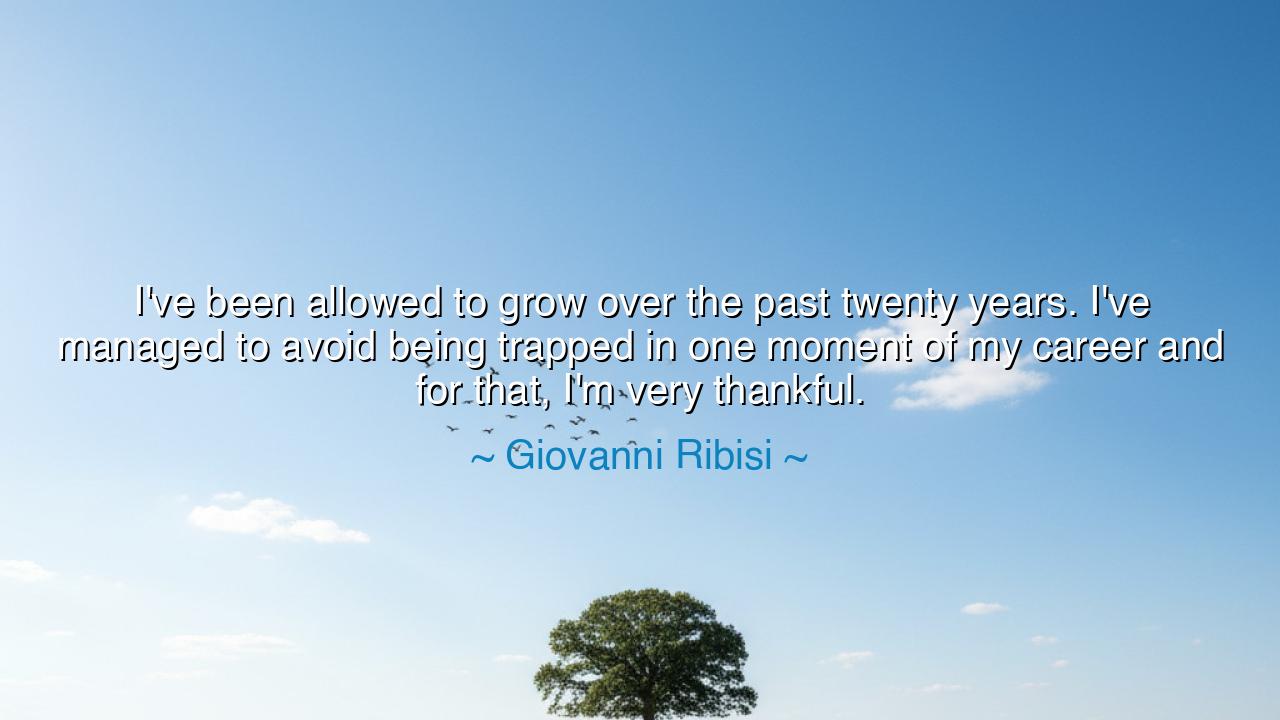
I've been allowed to grow over the past twenty years. I've
I've been allowed to grow over the past twenty years. I've managed to avoid being trapped in one moment of my career and for that, I'm very thankful.






Giovanni Ribisi, reflecting on the arc of his life’s labor, once declared: “I’ve been allowed to grow over the past twenty years. I’ve managed to avoid being trapped in one moment of my career and for that, I’m very thankful.” These words, though spoken of his craft as an actor, resound with universal wisdom. They are not about the fleeting glamour of roles or applause, but about the freedom to grow, to change, to move beyond a single identity, and to become more than the world once expected of him.
The ancients often warned against being chained to one season of life, for what is not allowed to grow will wither. A tree that never stretches its roots or branches cannot survive the storms. So too with the soul of a person: to be confined forever to one image, one moment, or one achievement is a prison, gilded though it may be. Ribisi’s thankfulness is born from the knowledge that he was spared such confinement. He was given the rare chance to transform with time, to shed skins like the serpent, to rise anew like the phoenix, and to continue becoming.
This truth can be seen in the stories of history. Consider the life of Leonardo da Vinci, who refused to be only a painter. He became an inventor, an anatomist, an architect, and a dreamer of machines centuries ahead of his time. Had he allowed himself to be “trapped in one moment” as merely the painter of the Mona Lisa, the fullness of his genius would never have been revealed. Ribisi’s gratitude is akin to Leonardo’s legacy: the acknowledgment that life’s greatest honor is the chance to grow beyond a single label.
Yet many are not given such freedom. Fame, society, or even fear itself often binds people to one role. The gladiator of Rome might have longed to be a poet but was chained by spectacle. The queen might have desired the anonymity of a mother’s simple life but was bound by crown and duty. Ribisi’s fortune, then, lies not only in his talent but in the space he was granted to evolve. His words “I’ve been allowed” speak not of entitlement but of humility, for he knows growth is a gift, not a guarantee.
At the heart of his reflection lies the sacred rhythm of time. Over twenty years, he was not frozen in one moment but allowed to walk through many. Each role, each season, became a stepping stone, teaching him something new, shaping him into something greater. The gratitude he expresses is not for fame or fortune but for movement, for the unfolding of self, for the mercy of not being trapped in stillness.
The lesson for us is clear: never let yourself be imprisoned by one moment, whether it be victory or failure. Do not cling so tightly to the past that you cannot grow into the future. Be thankful for the chance to evolve, and when life offers you a new chapter, accept it with courage. For to live well is not to preserve one moment forever, but to walk boldly through the many transformations life requires.
Practically, this means seeking growth in your own path: learning new skills, embracing new roles, allowing yourself to change with time instead of resisting it. It means not fearing reinvention but welcoming it. And above all, it means cultivating gratitude, as Ribisi does, for the opportunities—large or small—that allow us to become more than we once were.
Thus, Giovanni Ribisi’s words endure as a guide: to be thankful for growth, to resist the trap of a single moment, and to honor the gift of transformation. For life itself is not meant to be a statue carved in one pose, but a river, ever flowing, carrying us into new depths, new shapes, and new horizons.






AAdministratorAdministrator
Welcome, honored guests. Please leave a comment, we will respond soon